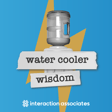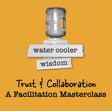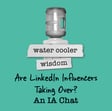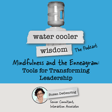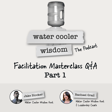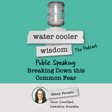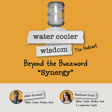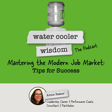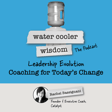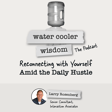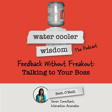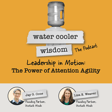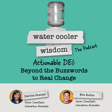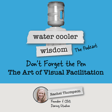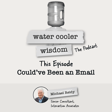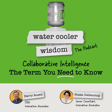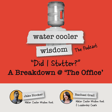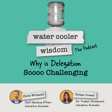Introduction & Overview
00:00:05
Speaker
If you Google productivity right now, you'll likely be served up with pages worth of productivity tools and competing articles telling you all the reasons productivity is down right now, leading us as leaders to chase any solution we can to get our work done.
Questioning Productivity Views
00:00:21
Speaker
But what if we're looking at productivity all wrong to begin with? On today's episode, we'll be joined once again by Chris Williams, who will break down what it means to be productive and alternate ways of measuring it.
Meet the Hosts
00:00:36
Speaker
Welcome to another episode of Water Cooler Wisdom. I am Rachel Graile. And I am Jake Blocker. Jake, I am so excited to be here with you today. We are talking about something that brings to mind the quote for me, it was the best of times, it was the worst of times. And that topic is productivity. Yeah, that sums it up very well, yeah.
Exploring Productivity Emotions
00:01:05
Speaker
Yeah. What's your relationship to productivity, Jake? Oh God. It's, I wish I was better at it. I guess I feel productive. I feel like I'm a highly productive person, but disorganized productive person. I think that's the truth of it. No matter how organized we are, there's always something we could do better or something that's coming on to derail us. So it's one of these things. It's like the work is never done.
00:01:34
Speaker
I completely agree. As soon as I think I'm getting it right, I realize I'm getting it wrong. If something happens and completely changes my thoughts of how I'm being productive. Oh, so relatable.
Introducing Chris Williams
00:01:48
Speaker
Well, I think this will bring a lot of relatable content to not just us, but to our listeners. So let's dive into it, shall we? Let's do it.
00:01:58
Speaker
All right, welcome back, Chris Williams. So Chris is the chief operating officer for Interaction Associates and has quite a bit of experience managing teams and individuals. His background includes over 15 years in the professional services space in business operations, recruiting, business development, and research. His prior work includes strategy consulting for Fortune 500 clients.
00:02:24
Speaker
Additionally, Chris is a workshop leader for Interaction Associates and has delivered training for clients, including Credit Human, Gilead Sciences, Dick's Sporting Goods, Lenovo, Wellington Management Company, and more. Welcome, Chris. Hi, Jake. Glad to be back.
00:02:41
Speaker
Chris, I'm so happy to have you here today to talk about this theme of productivity because I'll let our listeners know, I have the pleasure of working with you every day. I have a good idea of how much is on your plate. Probably, I don't know, maybe even the half of it.
00:02:58
Speaker
But yet, the way that I experience you is somebody who is so wildly productive, like you still find time to answer any questions I have or send me new resources that you've researched. And I just find it endlessly impressive. So I think we're going to get a lot from this.
Defining Productivity
00:03:17
Speaker
But before we talk about productivity,
00:03:20
Speaker
It's important I think that we define what it is even as a word because it seems to be tossed around a lot. So can you give us your definition and how it's being used by others?
00:03:33
Speaker
Yeah. Yeah. Really good question, Rachel. And thanks for those kind of words, by the way, in the intro, super, super nice. Yeah. So productivity is definitely one of those words that's thrown around and tossed around. If you look on Amazon as an example and you search productivity for books, you will find more than 10,000
00:03:52
Speaker
books written on Amazon or sold on Amazon. And so there's a lot of things and there's different runways that people take about what productivity is. I have a very particular kind of view on productivity and that's really the state of achieving important and valuable results. So it's actually a state of being.
00:04:15
Speaker
Versus just like, you know, how am I managing my time?
Metaphors & Perspectives on Productivity
00:04:20
Speaker
How do I manage my energy? Even though those are important elements, I think oftentimes when people think about the word productivity, people can go one way or another. Sometimes people lean to the time management space. They say, oh, productivity is just about managing time.
00:04:35
Speaker
I say yes it is about managing your time that's one aspect or tool of being productive but time management itself is not the same thing as productivity or production so that's why I like the definition my own definition of a set state of achievement.
00:04:56
Speaker
results. And I think a good metaphor for that is actually the agricultural industry. So I have some family in the agricultural space that are professional farmers in the United States, which you don't really hear of anymore. But in the agricultural space, people actually use the term, oh, that acre was productive, or we got a certain yield, we got a certain amount of bushels.
00:05:22
Speaker
of crops from this particular space. They're actually measuring a sense of output. How much are you actually achieving from a certain size piece of land or a certain type of crop? I think that's a good metaphor to use because it's not about all the activity that you have to do to produce a crop. It's ultimately about, did you get the crop that you can sell on the commodity market? I like that metaphor, Chris. Yeah, I love the metaphor. I love this idea of an estate of being.
00:05:53
Speaker
Yeah, and there's there's tons of, I mean, if you search productivity, just for books, like I mentioned, there's so many that I could just go through. So I just kind of want to name a few of those because it might give our viewers or listeners kind of a sense of the landscape. So I'll start with one that most people may have heard of David Allen. So David Allen wrote a book, Getting Things Done.
00:06:13
Speaker
Okay, getting things done. And the theme about getting things done is all about getting the system. So it's all about how do you take information in? How do you organize information in the categories so that when you're ready to pick up the category, everything is like organized and you can just engage and do. So it's more about organization.
00:06:30
Speaker
Then you have another person who I really like and I get a lot of my ideas actually from this person by the name of Cal Newport. Cal is a computer science professor at Georgetown University and I really like Cal.
00:06:45
Speaker
Cal, because not only is he a computer science professor, but he talks about the intersection of technology and knowledge workers today. One of his big ideas out there in the space is around this concept of deep work and digital minimalism. Cal is all about, how do you focus without distractions? How do you get into the deep work, which is the really important stuff that
00:07:07
Speaker
thinking, budgeting, creative work, and try to minimize the shallow work, the emails, the team's messages. So it's more about how are you dedicating your time
00:07:20
Speaker
from just a proportional standpoint, but also, what's your environment? What's your workspace? Is it actually set up to be optimal for productivity? I really like Cal Newport. You have some people that have been around a long time, like Stephen Covey, Seven Habits of a Highly Effective People. You have Tim Ferriss, who wrote a book about the four-hour work week, which is more about
00:07:45
Speaker
Envisioning the life you want, having freedom, having flexibility, outsource everything that's not bringing you value, and just build a system so you can only work four hours a week, which is kind of ludicrous. Not many of us can afford to work in. It would be nice. We're kind of envious of those people out there that are maybe just content creators that work four hours a week and they're getting millions of dollars.
00:08:08
Speaker
I don't know, YouTube payments a month. That would be really interesting. Another book or kind of a common one you hear about today that's been in the space for a number of years is James Clear, who wrote the book Atomic Habits. This is a huge book.
00:08:24
Speaker
bestseller really focuses around how do you make incremental improvements and routines in your life where you're actually shifting your identity, you're shifting your mindset, and it's not about the big goal. It's really about building these small habits and making incremental improvements. All of these people come at productivity in a different way, and they all have really interesting ideas that I think are really powerful and interesting for us to know about and to think about.
Multidimensional Productivity in Teams
00:08:51
Speaker
I love it. In a way, you're proving our point, too, because you have time to source all of these great books and read all of these great books. And for our listeners, we'll be linking all of these wonderful resources that Chris has just mentioned. What I'm hearing as a theme in those is that
00:09:09
Speaker
It's that state of being, so yes, you want to measure how many bushels you get, how productive was the field, but that there's also these other elements of success that come into play that demonstrate really how productive you have been. Can you talk a little bit about those different elements?
00:09:27
Speaker
Yeah, absolutely. So if you think about productivity and you think about it from just a macroeconomics point of view, the Department of Labor has their own thing about what is productivity. And it's this kind of crazy metric where they're actually measuring the number of hours that workers in the United States spend on the job versus what's the output in service of the United States. So it's this huge number. But I think it's an interesting
00:09:54
Speaker
definition to look at because it has this input-output relationship. And so when I think about productivity, it is the results. Are you producing the results? But you also have to think about, well, what are the inputs? And so when you think about success, it's not just about did you get the results. I think there's other dimensions of success where
00:10:16
Speaker
Process is really important. Like what is your process? Like how are you setting up? What are the systems that you use? So that's one element. And then another element is relationships. How are you actually connecting, engaging, building agreements with other people? And that's really important as well.
00:10:34
Speaker
I think about it as this three-parted triangle where you've got results, which is ultimately where you're going for, but those are being driven by other dimensions such as the process dimension and the relationship dimension. I think that's really important today because most knowledge workers are not operating solo. Often your output
00:10:56
Speaker
Is team based you require a lot of work you require other people from other departments other expertise and it's really about the team working together to get the ultimate results than it is for like one.
RPR Framework & Industry Applications
00:11:09
Speaker
You know superhero employee that's doing it all that's just not realistic in today's world and so that multi dimensional approach i think is a more helpful way to think about productivity especially the knowledge worker environment that many of us live today.
00:11:26
Speaker
Yeah, it's not about mouse movements. It's a little bit more than that. I want to drill into the results process relationship a little bit more because Interaction Associates, that's a big piece of a lot of our training and a lot of people that feel the impact of that.
00:11:45
Speaker
I'd love to provide you some examples. I'd like to get some examples. I want to provide a couple of scenarios and I'd like to hear how could you use that results process relationship or RPR, so you don't have to say all three words, the RPR framework in these industries and job titles. Sure. Let me start with one here. A hospital system being the industry or workplace and then a nurse being the job title.
00:12:15
Speaker
Yeah, that's a great scenario. And I think nursing is such a challenging occupation because nurses are put in this place where you're trying to measure productivity. But it's strange because nursing is not about productivity. Ultimately, it's about, are you providing excellent patient care? And so there's this kind of softer side about quality, care, satisfaction.
00:12:39
Speaker
That's really important so i think in hospital systems you often have this battle between the financial people. And the executives and ultimately people on the front lines are actually providing care and so i think because of nerd nurses and there's so many different fields of nursing is omg why and internal surgical infusion centers,
00:13:02
Speaker
Family medicine so nurses do different things in different settings it's hard to kind of put your put your finger on one element but if i had to break down nursing productivity and use results process relationship as a free more some things i think about is if you think about results.
00:13:20
Speaker
I would think about maybe something like a quality score would be really helpful. So there's ways to actually, you could survey your patients after they get released from a hospital and actually have the patient rate on a scale. Maybe it's a one to 10 scale. The level of quality they felt like they received from that nurse practitioner or that bedside nurse that's really assisting them. So that's one way to think about it.
00:13:48
Speaker
I think if you're more of a financial person in nursing, you could also look at it from a kind of an hour with the patient versus how many hours are you working in a hospital. So if a nurse is working, let's say 35 hours a week, what percent of those
00:14:08
Speaker
like paperwork or emails or in meetings as an example. So that's another way to think about it. I've also seen some hospitals actually measure its nurses on wasteful spending, which is kind of an interesting thing because if you think about maybe your own experience in a hospital, the nurses are the ones that are actually using a lot of this information.
00:14:31
Speaker
You know, equipment and surgical bandages. And so it's like, well, we obviously don't want to waste hospital supplies. And so how many items do we open up that actually don't get used and get thrown in the garbage? So that might be another interesting one you might want to think about. Moving to the next dimension around process.
00:14:48
Speaker
I think a good one for this is around resource allocation or staffing efficiency. I think many of us have maybe been in a hospital with a loved one and seen nurses running around and maybe noticed like, wow, there's this one nurse that's literally seen 10 patients and is really stressed out.
00:15:04
Speaker
And this other nurse seems to only have two patients that they're watching and they seem to be taking like a break every hour for 10 or 15 minutes. And so maybe the staffing doesn't really seem equitable or allocated appropriately. So that's something you might want to use as more of a process dimension to say like how is there actual staffing
00:15:23
Speaker
Allocation or efficiency or flexibility that's that's another lens you could look at and then I think from the relationship standpoint I go back to communication you know what what is the satisfaction level of the patient around the communication they receive.
00:15:39
Speaker
From the nurse do they feel like they understand the procedures do they feel like i understand the overall macro process of the hospital uses around paperwork or electronic medical records or what is it look like to be discharged a nurse is really critical because they are typically at the front of line.
00:15:57
Speaker
really guiding the patient much more than the doctor. And I think many of us who have been in a hospital setting can relate to that, that that nurse is really probably our closest point of contact and our closest to actually how we maybe feel about that hospital system. Yeah.
00:16:16
Speaker
I think that's a great example and nurses, that's a very complex one, complex example to give because they do so many things and like you said, the nurse occupation is so broad, they cover so many areas. One more for you, what about software developments and software development tech area and a project manager?
00:16:39
Speaker
Yeah, good question, Jake. Knowledge work is really challenging to measure. How are you actually measuring productivity? There's actually some good best practices in the software development industry. One metric I'll give you is called DORA, D-O-R-A. It actually was developed by the Google development ops team.
00:16:58
Speaker
it's kind of this multifaceted approach on how you actually measure things so they include things like measuring velocity or efficiency or actually code stabilization or quality metrics so it's interesting and it goes into things like well what's the cycle time like how much time does it take for us to actually do the code and get the code out into production so it's measuring speed that's one thing deployment frequency so it's measuring
00:17:26
Speaker
How often is the release getting pushed into production how long does it take to actually fix something that is a failure like if we have a bug in our system and everyone on the team knows that how quick are how prompt are we actually fixing that bug and actually releasing that to our application in the marketplace so that that software can
00:17:45
Speaker
be updated overnight. And then they also have another one called change failure rate, which is the percent of deployment is actually causing failure. So if we write a certain line of code and we put it out, we could say, OK, five percent of that code is actually failing or not working in some way. So it's also kind of a quality standard. I like I like Dora because it is multidimensional. It's not just one area. There's another metric I'll give you, which is from Microsoft. They have a kind of a different spin on
00:18:19
Speaker
And that stands for things like what's the satisfaction? What's the performance? What's the activity level? What's the communication level? And what's the efficiency level? So it's an acronym that's meant to measure those things. And I think what's really interesting about space is if I take the space acronym and map it to results process relationship, our own model of dimensions of success, what's really interesting is most of the majority of those acronyms actually map to process and relationship dimensions.
00:18:48
Speaker
It's really an activity level. It's the communication and collaboration level.
Technology's Impact on Productivity
00:18:54
Speaker
It's the efficiency and flow that they're heavily related on process because they know in a correct way that if the process is really tight and really efficient, ultimately they're going to get the results that they intend, which is all about the satisfaction of whatever they're developing.
00:19:14
Speaker
That is amazing that they clocked in on that. And I love the way that you're framing productivity in terms of how do we measure it? How do we make it real? That's not my default to think about that. And I see also appreciate that you're bringing in some of these technological tools that are being used to apply to that. I see sounds like with space, they might be getting some things right.
00:19:39
Speaker
But I think there may be some other implications that come with using tech to measure productivity. And I imagine you have an opinion on that. I'd love to hear what are your thoughts on the implications of tech and the measurement of productivity.
00:19:57
Speaker
Yeah, it's a great question, Rachel. I think technology is such an interesting element. If you really think back on our society, it's played a huge part in the last 10 to 15 years. I mean, you think about when the iPhone came out and only a few people had it. You think about today, I don't know a single person that does not have an iPhone or an Android smartphone, even older people.
00:20:19
Speaker
Today have it and you look at the younger people. I mean, there's people in middle school. It's like if you don't have a smartphone in middle school, like forget about it. You're behind, right? So it has a huge implication. And so I think as a society and we think about this podcast is really around, you know, it's called water cooler wisdom. So we're trying to give you wisdom that you can use at work. I think it's really important.
00:20:42
Speaker
for people to think about how is technology interacting with our work. And so there's a couple of big implications I think technology has. I'd like to go through really briefly about what it does to our society. Number one is this instant communication. So everyone has the ability to instantly communicate with almost anyone in the world. Does that mean that's a good idea?
00:21:03
Speaker
maybe, maybe not, but you have the capability to do that. Number two is that there's this constant capability to be connected. So that's the difference between just, I'm connecting with people, but actually I have the ability to look up information. In a way, all of us have a supercomputer in our pockets where we can pull things out and we can go to chat GPT as an example, and we can type in a question and see what the AI gives us. I think the design of the way that a lot of these technologies are used
00:21:34
Speaker
is really important to think about, and we know that in particular social media, we know that social media and the way the applications are designed is very intentional, though social media is designed
00:21:49
Speaker
to hijack our attention. It's designed to take as much attention as possible from us. And so that's a big implication too, like where is our time going using technology? And then some other downsides of tech that we have to just be really mindful of and careful about, I think is
00:22:06
Speaker
You can spend so much of your life in tech that you aren't spending as much time in the real world or you're minimizing those in person or those human connections. And so there's a loneliness epidemic. We know the United States. We know that studies show that worker attention.
00:22:23
Speaker
And focus is actually gone dramatically downhill in the last five years so i'm a big believer that that is a critical deficiency in america is just like our lack of attention. Is plummeting and i think technology is a lot to do with that i think it's actually in a way rewiring our brain.
00:22:44
Speaker
to really change how we process information, the way that we remember things, like how does our memory actually work. And so I think it's important to be really mindful of technology. Technology can be an amazing tool, but just like any tool, it can be overused.
00:23:01
Speaker
And it's really important to be mindful about using the right tool for the job and then knowing when it's not appropriate to just lean on technology. I think there's a big misbelief that technology is going to solve everything in America. And I think that's just false. That's just not the case. I think it can do a lot of good, but I don't think technology is the solution to everything.
00:23:25
Speaker
Yeah, a couple more to add on there for that question is that I've heard from friends and also read about one is a crazy scenario. This one person I read about, they, uh, to keep people productive, they required and let them work remote. They required them to stay on zoom all day. So everyone was on zoom at all times and you, they had to management could see them working. And this was not like customer service. This was just, you know,
00:23:52
Speaker
about just being, just being watched and make sure they were like in front of their computer. Wow. That's scary. And then there's also, again, I think this was one more people can relate to. And I've heard this from friends of having to move their mouse every once in a while, even if they are working, maybe they're reading something like that, they pray it out or writing something like that. If there's their status goes to yellow. Oh no. Like I have friends who have bought the mouse mover that will just do it for them. So they don't have to deal with it.
00:24:19
Speaker
You know, I love that, Jake, because there's always somebody who's going to find the loophole to get around it, like the computer surveillance systems that organizations often put on employees computers. You know, they're all geared towards that. They say it's about productivity, but really it's about just watching people. And so that's that old school way of like managing by walking around, like making sure people are in the office, make sure people aren't taking too much of a smoke break or a lunch break.
00:24:47
Speaker
And I really want to challenge leaders out there to say, if that's your company, if that's how you're measuring productivity is the mouse movement and the amount of time you spend on, quote, productive activities, I would really challenge you to really reset your expectations of what is the result you're trying to go for with employees. There's so many surveillance tools on the market now I've seen where if you go to the website, it's kind of hilarious where they will categorize
00:25:15
Speaker
things as productive or unproductive websites. So as an example, YouTube might be categorized as unproductive, as would Facebook because the company doesn't want you to access social media, but something like dictionary.com or chatgpt might be productive. And it's like, well, who's
00:25:35
Speaker
Who's there to draw that line? I think YouTube is an amazing resource. And I think that employees, if they're looking to learn something, YouTube, you can find almost anything on YouTube to learn yourself. And it could be a quick skill, like maybe I need to learn how to do a pivot table in Excel.
00:25:51
Speaker
And instead of having to ask my manager how to do that, I can go to YouTube and search that. And within five minutes, I find this amazing instructor that teaches me how to do it. And then I'm three times more productive because I just learned that myself. So I think we have to be really careful about classifying things as productive or unproductive activities.
Strategies for Individual Productivity
00:26:09
Speaker
Yup. I completely agree. I like all that. Well, let's back up just a little bit on this. And I want to ask you about some quick tips and strategies as we wrap up. What are some quick tips and strategies that someone might use to be their most productive self? And what are some things you found that work for you or maybe others?
00:26:34
Speaker
Yeah, great question. So I think the first one that I would say is I like the word discipline focus. And discipline sometimes can get this bad connotation, especially in American society. It's like, oh, discipline, that's like stripped, right? But a few years ago, I'll just say I took the Clifton String Finders assessment. And what's really interesting about this is they have all these different attributes you can do.
00:26:58
Speaker
And they come back typically through top five. And by the way, they can change over time. But I remember distinctively when I took this assessment, my number one was discipline. My number two was maximizer. So it's like, okay, I'm like set up to be a productivity guru, right? But I say that because I think that discipline focus is really, really important. And we know, and research backs this up, that our attention and our ability to focus on something that's really, really important
00:27:28
Speaker
is critical for our ability to be productive. Research shows that if you are switching tasks where you're moving from one task to another, you're moving from one application to another, it can take up to 40 minutes for your brain to get refocused.
00:27:44
Speaker
And so if you're bouncing around between things, you're operating at what Cal Newport would say, that shallow work. You're not able to get down to the deep work. And so that would be the first thing I would recommend for any of the listeners is really ask yourself, how much uninterrupted time do I plan for this week?
00:28:06
Speaker
Do i actually have time on my calendar to have discipline focus when i say that what i'm really describing is do i have thirty minutes of time.
00:28:15
Speaker
then maybe I'd start there where I'm just focusing on a single task. I'm not looking at email. I close down Slack or Microsoft Teams. I may even go in a different room away from my computer and maybe work offline on a notebook, especially if I'm doing some thinking or doing creativity. I think it's a really important question to ask yourself is how much uninterrupted time do you have to do that deep work and that discipline focus? I think another area that kind of leans into this
00:28:43
Speaker
Are kind of bills on the discipline focus is really listening on your priorities for the week. I think it's really important for everybody who's a worker to sit back in the beginning of the week. If you don't have this as a habit, I recommend you do it that carve an hour out of your time, the beginning of each week to sit down and think, what are my top four to five priorities that I'm going to achieve this week? And it's the results. It's the results we're going for.
00:29:10
Speaker
And if you have on there, like I'm going to check my email, I think you need to look at your priority list, right? It's really what are the big rocks? What are the goals that you're trying to do? And I think for many people, most of us have maybe annual goals or quarterly goals, but I think it's important to get it down to that more discrete level. Like if I have a quarterly goal, how do I break that apart into smaller pieces and say, okay, what's the monthly goal that's going to get to my quarterly results? What's the weekly goal that's going to get to that monthly result? Like break it into smaller chunks.
00:29:39
Speaker
where you can make that progress so that's that would be tip number two tip number three for me would be about energy management so understanding yourself your personal preferences when is your energy optimal for certain things.
00:29:54
Speaker
So some of us are better off doing that deep thinking and planning in the morning, and others for us it's later in the afternoon. So for me personally, I like to spend my morning hours doing thinking, doing planning, doing writing, things that take a lot of concentration.
00:30:11
Speaker
maybe even prepping for a meeting like thinking about a desired outcome and then the afternoon is really where i try to position most of my collaborative conversations where i'm having these are people i tend to try to stack those in the afternoon just because that works for me but it's probably different for you i think each of us need to ask that question like where is my energy level and how can i relate my task and match them up to what makes the most sense on an energy level.
00:30:41
Speaker
I think the fourth one that is probably the biggest one that just drives me nuts when I talk to people is not letting email run your day.
00:30:52
Speaker
Not letting your email run your day. And if you step back and you really think about email, email is kind of hilarious. We have moved from the days of fax and the days of sending letters and snail mail to now it's just so easy to send out an email to somebody else or a colleague. Very few emails that we send are actually urgent that need to be handled in, I would say, four hours or less. Very few things.
00:31:18
Speaker
And I would challenge any of the listeners that if you have something that needs to be handled in four hours or less, email is probably not the right communication tool. You probably need to pick up the phone and actually just leave a voicemail and try to get someone in a conversation. So don't let email run your day because if you do, you're very much being reactive to other people's requests versus being proactive around your priorities.
Wrap-up & Rapid-fire Questions
00:31:43
Speaker
I still think email is a great way to communicate with people because it is an asynchronous approach, but you've got to be really careful about it. Personally, what I do, a lot of people ask, Chris, how do you keep up your emails? How do you do this? I have two times a day of 30-minute blocks where I process my email.
00:31:59
Speaker
So I'll look at my email, I've got 30 minutes. I'll say, okay, I'm trying to get through as many emails as I can in 30 minutes. I may even schedule those emails to go out later in the day because I don't want to bombard people. I don't want people to think they have to respond to me right away because I'm the CEO of the company. Oftentimes I'll write the email in the morning, but the email actually doesn't show up in your inbox until later in the afternoon because I don't want you to read it. I want you to read it later. So I purposely do that as well. That's a kind of a technique I use.
00:32:27
Speaker
That is going to change my whole day. I'm sitting here watching the numbers go up on my inbox and I'm going to wait to process them. Chris, you've given us so many great tips and ideas and context. We could obviously continue this conversation for a long time, but we are going to close in the interest of time. Before we do that, however, we've got some hard hitting questions to ask you just to help our listeners get to know you a little bit better. We call this our rapid fire section. Are you ready?
00:32:57
Speaker
I'm ready. Okay. Here comes our first one. Take some time if you need. Coffee or tea in the morning? I'm a coffee person. Early bird or night owl work style? Yeah, definitely on the early bird side. Emails for the night owl. An app platform or software that you swear by for your work. It's going to be hard to choose just one maybe.
00:33:24
Speaker
Yeah, so for my personal to-do list, I have paper that I write it down. But for longer term things that don't necessarily have a due date, but I still want to get them out of my mind, I'm a big user and believer in Microsoft Planner, where you can have different buckets of things. And I can use it to just organize maybe an article I read that I want to read later. I use it to generate ideas. It works on my smartphone. So if I have an idea during lunch, I can pull it out real quick and just type something in.
00:33:52
Speaker
So that's a way to get all the things in my mind out of my mind. And it's a system. It's very much like David Allen says, get it out of your mind, put it in a system. So I use Microsoft Planner to organize that into different buckets. And it's really flexible because you can set it up how often you want. You can use dates. You cannot use dates. It's really flexible. I love that. I'm going to spend some more time there. A couple more here. A book that made a significant impact on you.
00:34:21
Speaker
Yeah, one book is Drive by Pink. That's a really good book. It talks about motivation. Yeah, Daniel Pink, motivation. What really motivates workers today? It was really an eye-opening book for me personally. That's a fantastic read. Last one here. If you could have a water cooler chat with anyone dead or alive, who would it be and why?
00:34:44
Speaker
I love this question. I think for me, it would probably be Bob Iger, who's the CEO of Disney. Bob has, he was Disney and then he left Disney and then he came back to Disney and there's a lot of changes he's making. But just, I think Disney is such a fascinating company because it's not only a theme park company, but it's a movie business. They own ESPN. It's a storytelling company.
Conclusion & Outro
00:35:07
Speaker
It's probably such a complex organization to run. And I think just having a conversation with him,
00:35:12
Speaker
about a leadership and maybe routines and techniques in his life would be really fascinating.
00:35:19
Speaker
Yeah, I love that. Well, I could see stranger things happening, so perhaps that will happen sometime. Thank you so much, Chris. It has been such a pleasure to have you here today. I think you've given us so much to think about, and we really appreciate you taking the time to join us. Thank you listeners for joining us here on Water Cooler Wisdom, and thank you as always, Jake. We'll see you all at the next one. Thank you, Rachel. All right. Have a great day, everyone. Thank you so much.
00:35:49
Speaker
Thanks for listening to Water Cooler Wisdom. This podcast is brought to you by Interaction Associates, a leading professional development and leadership training organization whose mission is to help people work better together. If you'd like to learn more, visit interactionassociates.com. If you have questions, comments, or are interested in collaborating with this podcast, you can email us at watercoolerwisdom at interactionassociates.com.

